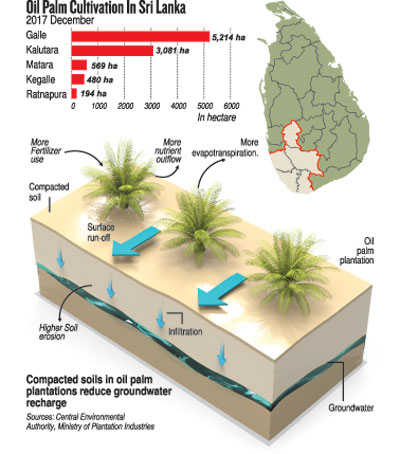News
Traditional cash crops under threat from palm oil, warns environmental regulator
The Central Environment Authority is warning of a possible threat to Sri Lanka’s traditional cash crops as palm oil cultivation expands.
“A threat has been posed by palm oil cultivations on all existing traditional plantation crops like tea, rubber and coconut and if the current trend continues, the remaining rubber plantations will be converted into palm oil cultivations in the future,” a recent study by the Central Environment Authority on palm oil cultivation reveals.
The CEA, however, said it needs more time to study the claimed adverse impact such as depletion of water, socio-economic issues, low growth and high soil erosion caused by palm oil cultivation.
An official of the CEA said that during the past few years they received many public complaints. With no conclusive evidence of the ill effects of palm oil plantations, the CEA has appointed a committee consisting many stakeholders to look into public concerns.
Secretary of the Ministry of Plantation Industries, J.A.Ranjith told the Sunday Times that there are claims that palm oil cultivation has reduced the groundwater levels in many areas.
However, he said that the reduction of groundwater levels may also be due to the drought. He added that research is needed.
“Environmental societies have made many complaints, but when we told them to take us to those sites, none of the societies came forward,’’ he said.
A policy decision was taken in 2014 by the Ministry of Plantation Industries to expand the palm oil cultivation from 12,000 hectares to 20,000 hectares.
Mr. Ranjith also said that the plantation division of the ministry, CEA and the Coconut Research Institute will be developing a plan to regulate palm oil cultivation.
Due to the non-availability of a proper authority to monitor the palm oil cultivation, the CRI is making inquiries.
The chairman of CRI, Jayantha Jayewardene said that the growth of the palm oil cultivation is slow.
Commenting on the issue regarding the reduction of groundwater, he said that no scientific study has proven the claim.
“There are objections from many people with other motives, such as acquiring more land,’’ he said.
Mr. Jayewardene said that water saving practices can be adopted, but since there was no requirement, this is not done.
Meanwhile, Asoka Nugawela, chair professor of the department of plantation management at the faculty of Agriculture and Plantation in the Wayamba University pointed out that a rubber tree takes up 63 litres of water a day compared with a palm oil, which absorbs 250 litres a day.
He said that palm oil is mostly cultivated in the wet zones of the country where the annual rainfall is about 3,500mm. About 30 per cent of the annual rainfall is acquired by the rubber cultivation whereas palm oil acquires 37 per cent of the annual rainfall.
“Whether the soil water retention is high or low depends on the management, if soil water retention is not properly managed it will wash off to the rivers and seas and steps must be taken to retain rainfall in the soil,’’ he said.
He emphasised that drying up of soil cannot be attributed to the crop but to the management.
Environmentalist Sajeewa Chamikara of the Movement for Land and Agriculture Reform told the Sunday Times that palm oil cultivation has worsened the groundwater levels in the country.
“Because the plantation has been carried out without undergrowth, it results in soil erosion and this in turn causes the groundwater levels to remain stagnant and gradually evaporate during the dry season,’’ he said.
He further raised concerns over the fact that water sources such as rivers and streams near the plantation will dry up and eliminate aquatic life.
Petitions have been sent by the District Secretariats to the Ministry of Plantation Industries to look into claims made by area residents that the palm oil cultivation is damaging environment.
An official of the Galle District Secretariat said that one of the major complaints is the reduction of water levels in the areas although it was not proven.
Matara District Secretary Pradeep Ratnayake said that Palm Oil cultivation is almost 50 years old in the country and the protests only arose recently.
“Secretariats do not have a legal authority to stop the cultivation, the sole authority lies with the ministry to take a decision on whether to stop or limit the palm oil cultivation in the country,’’ he said.

